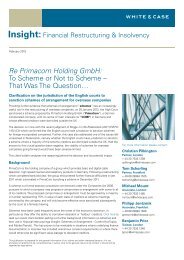Mexican Legal Framework of Business Insolvency - White & Case
Mexican Legal Framework of Business Insolvency - White & Case
Mexican Legal Framework of Business Insolvency - White & Case
You also want an ePaper? Increase the reach of your titles
YUMPU automatically turns print PDFs into web optimized ePapers that Google loves.
Claims by creditors operate at two levels in insolvency proceedings—firstly, for purposes<br />
<strong>of</strong> determining which creditors may vote in the proceedings and how they may vote<br />
(according to the class into which they fall and the value <strong>of</strong> their claim, where that is a<br />
relevant factor) and, secondly, for purposes <strong>of</strong> distribution. The procedure for submission<br />
<strong>of</strong> claims and their admission is therefore a key part <strong>of</strong> the insolvency proceedings.<br />
Consideration should be given to determining which creditors should be required to submit<br />
claims and the types <strong>of</strong> claim that should be submitted. Those claims might include, for<br />
example, all rights to payment that arise from acts <strong>of</strong> omissions <strong>of</strong> the debtor prior to<br />
commencement <strong>of</strong> the insolvency proceedings, whether or not they are mature, liquidated<br />
or unliquidated, fixed or contingent. Consideration should also be given to the procedures<br />
applicable to the submission, verification and admission <strong>of</strong> claims, the consequences <strong>of</strong><br />
failure to submit a claim and review <strong>of</strong> decisions concerning the admission <strong>of</strong> claims. 58<br />
While creditor recognition is most relevant for liquidation, the process begins during<br />
the conciliatory stage and, if required, will continue through the liquidation stage<br />
[LCM 120, 177].<br />
i. Allowable Claims<br />
The <strong>Insolvency</strong> Law does not make a distinction and therefore it is generally accepted<br />
that all valid claims are subject to recognition. This means that recognition would<br />
include claims that are secured or unsecured, as well as claims <strong>of</strong> a civil (e.g., tort),<br />
commercial, administrative (e.g., taxes, fines), or labor nature. It would also include<br />
present claims as well as future claims originated pre-petition.<br />
While the <strong>Insolvency</strong> Law is silent in this respect, arguably, unenforceable claims<br />
(e.g., gambling debts, claims for which the statute <strong>of</strong> limitations has lapsed, etc.)<br />
would not be recognized.<br />
58<br />
UNCITRAL (2005), p. 249.<br />
<strong>White</strong> & <strong>Case</strong><br />
79
















